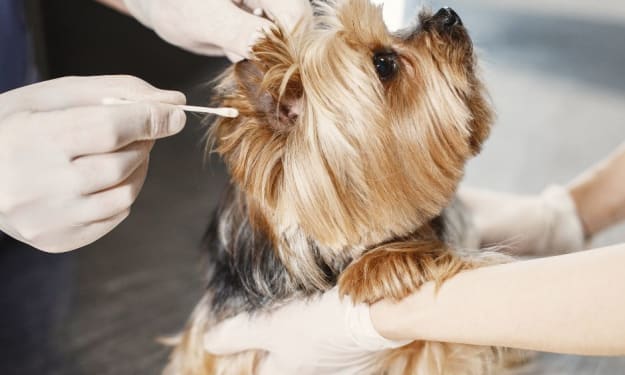Benefits of vaccinating your pets
The purpose of vaccines is to stimulate the immune system’s defense mechanisms and prime it to fight off future infections from pathogens.

Vaccines encourage the immune system to produce antibodies that recognize and eliminate pathogens that enter the body.
The widespread use of immunizations over the past century has, according to experts, saved millions of animals from illness and death. Vaccinations enhance your pet’s overall quality of life while safeguarding it from dangerous and extremely contagious diseases experts from Animal Hospital Jacksonville.
What are the benefits of immunizing my pet?
It is crucial to vaccinate your pet since it helps to avoid infectious diseases and can offer protection from potential illness. Particularly when compared to the expense of treating the diseases if they are contracted, vaccinations are rather affordable explain experts from Animal Hospital Jacksonville beach. You can work with your veterinarian to address your pet's unique needs. There are many different illnesses that differ from region to region.
Diseases that affect both cats and dogs
The most crucial disease to receive a vaccination against is rabies because it can kill any creature, including people. The main means of transmission are animals that carry the illness. Due to the danger of rabies, immunization is needed by local legislation and for international travel. In North America, giardia is a fairly widespread water-borne illness that can affect almost all mammals. It spreads mostly through tainted surface water. Giardia cysts may withstand very low temperatures.
Diseases that Affect Dogs
- Since practically every dog will come into contact with the distemper virus at some point in their lives and because the disease it causes is frequently fatal, it is a significant pathogen suggests the experts from Animal Hospital Arlington. The symptoms of this virus, which affects numerous bodily organs and the mental system, include fever, coughing, vomiting, diarrhea, eye discharge, and listlessness. One to three weeks following infection, death may ensue. Dogs can contract the hepatitis virus through their urine, feces, and other fluids. The main organ affected is the liver, and severe instances can be deadly. The highly contagious parvovirus spreads through feces. Unfortunately, this virus can endure for a very long time outside of the host's body. Severe vomiting and diarrhea brought on by infection, especially in young puppies, can result in shock and even death.
- Dogs commonly become infected with leptospirosis when they drink from rivers, streams, puddles, or ponds that have been contaminated by the urine of infected animals. Leptospirosis is a disease that affects dogs as well as other mammals, including humans, and is caused by the Leptospira bacterium, which is carried by wild animals and livestock. This illness can be fatal because it affects the liver and kidneys, which can lead to organ failure or damage. The leptospira bacterium might linger in your dog's system undiagnosed for a very long period since it can be challenging to diagnose. Fever, nausea, fatigue, abdominal pain, or excessive urination are some symptoms. Although organ damage is permanent, the disease can be controlled if treated early. According to the experts from Animal Hospital Race Track Road, an increase in urban animals has led to the emergence of new leptospirosis strains in Canadian dogs. However, more recent vaccines that provide broader protection are now accessible. Consult your veterinarian about vaccinating your pet against leptospirosis.
- Infection and inflammation of the canine respiratory system, sometimes known as "Kennel Cough," affects the lungs and other respiratory organs explains Vets Jacksonville. The majority of boarding kennels demand this illness immunization.
- Lyme disease, which has a long incubation time and hazy symptoms and is brought on by bacteria carried by particular kinds of ticks common in Canada, may be exceedingly challenging to diagnose. The liver, heart, neurological system, joints, and kidneys are some of the targeted organs.
Cat Diseases That Are Common
- The Feline Immunodeficiency Virus, which causes feline AIDS, is not the same as HIV, which causes AIDS in humans. FIV impairs immunity and makes it difficult to fight off infections. FIV-positive cats might appear healthy for years until their immune systems become unable to combat illness. FIV has no known treatment, putting all outdoor-going cats in danger.
- Feline distemper, also known as panleukopenia, is common and frequently fatal. The majority of cats will encounter it during their lives, thus immunization is crucial. Fever, depression, nausea, diarrhea, and appetite loss are symptoms.
- The most frequent upper respiratory illness in cats is feline viral rhinotracheitis (FVR), which causes fever, appetite loss, sneezing, discharge from the eyes and nose, mouth breathing, and coughing. FVR causes lifelong infection even when successfully cured suggests Vets Arlington.
- The upper respiratory system is also impacted by the feline calicivirus (FCV). Fever, stomach ulcers, and tongue blisters are among the symptoms. Cats with FCV are lifetime carriers and exhibit symptoms like runny eyes and sneezing even after treatment.
- Feline Tearing, nasal discharge, and occasionally sneezing are symptoms of chlamydiosis, a moderate upper respiratory illness that affects the mucous membranes of the eyes. Chlamydia is more likely to spread if your cat is boarded.
- Four good reasons to vaccinate your pet
- Many pet ailments are prevented by vaccinations.
- For diseases that may be prevented, vaccinations can help patients avoid expensive treatments.
- Vaccines protect against diseases that can be spread between animals and between animals and humans.
Do shots guarantee protection?
For the majority of pets, vaccinations are successful in preventing current illness or reducing the severity of clinical indications. To lessen the chance of a protection gap, it's crucial to adhere to your veterinarian's recommended immunization regimen.
Does giving my pet a vaccine carry any risks?
Any sort of medical care carries some risk, but the risk should be assessed against the advantages of defending your family, your community, and your pet from potentially lethal illnesses. Most animals respond favorably to vaccinations explains Vets Race Track Road.
While Mild and transient adverse reactions after vaccination are typical, serious responses are uncommon. Sarcoma growth, a rare but dangerous adverse reaction, can appear in cats weeks, months, or even years after receiving a vaccination. The prevalence of sarcomas has significantly decreased as a result of advancements in immunization technology and technique.
Why are immunizations necessary for puppies and kittens?
Animals that are very young are particularly vulnerable to infectious diseases because their immune systems have not fully developed. The antibodies in their mother's milk provide them with protection, but because their immune systems are still developing and the milk antibodies are depleting, there may be gaps in their defense. A series of vaccinations are often advised to make sure that the puppy or kitten receives a vaccine as soon as possible after maternal antibodies have subsided.
In many cases, the first dosage of a vaccine works to prepare the animal's immune system against the virus or bacteria, and subsequent doses work to further stimulate the immune system to develop the critical antibodies required for long-term protection. Puppies and kittens may have insufficient immunity as a result of poor vaccinations, leaving them susceptible to infection. A series of vaccines are planned, often spaced 3–4 weeks apart, to offer the best defense against disease during the first few months of life. The last shot in the series is typically given to puppies and kittens when they are around 4 months old, although a veterinarian may adjust the timetable depending on the risk factors of a specific animal.
What shots does my pet need to get?
The majority of pets in a specific region or area should receive "core" vaccinations since they offer protection against the diseases that are most prevalent there. "Non-core" vaccines are only given to specific animals with particular needs. In order to tailor a vaccination regimen for the best protection over the course of your pet's life, your veterinarian will take into account the risk of exposing your pet may experience to a number of preventable diseases. Discuss your pet's lifestyle with your vet, taking into account any anticipated travel to other areas and/or any interaction with other pets or wild animals, as these things can affect your pet's risk of contracting certain diseases.
How frequently does my pet need vaccinations?
While some immunizations require more frequent schedules to maintain an acceptable degree of immunity that will continuously protect your pet, many vaccines offer adequate immunity when given every few years. A vaccination regimen that is suitable for your pet will be decided by your vet.
Conclusion
Vaccinating your pet is essential for their well-being. Following immunization, it is typical for pets to suffer some or all of the moderate side effects listed below, usually commencing shortly after the vaccination. An under-the-skin, tiny, hard swelling may appear at the site of a recent immunization. It ought to start to go away in a few weeks. Contact your veterinarian if it lasts more than three weeks or appears to be getting bigger.
If your pet has ever had an adverse reaction to a vaccine or treatment, always let your veterinarian know. If unsure, wait for 30 to 60 minutes after the immunization before bringing your pet indoors.






Comments
There are no comments for this story
Be the first to respond and start the conversation.